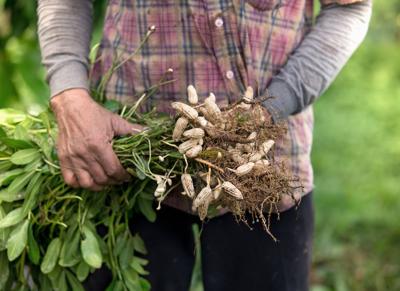
South Carolina farmers grew 106,000 acres of peanuts in 2016.
When most U.S. House bills have names like The VA Scheduling Accountability Act or The Bankruptcy Judgeship Act of 2017, a name like The South Carolina Peanut Parity Act really stands out.
U.S. Rep. Joe Wilson’s office announced May 18 that Wilson, a Midlands Republican, had introduced the peanut bill — so of course we had to find out more.
It turns out the silly name represents a fascinating shift in South Carolina’s agriculture scene: the fact that the Palmetto State has gone from an essentially non-peanut-growing state to one of the top peanut-growing states in the country in the last decade.
The bill, which has the support of the entire House delegation, would give South Carolina representation on the U.S. Department of Agriculture’s Peanut Standards Board.
“Since the Peanut Standards Board was created in 2002, South Carolina’s peanut farmers have been without a voice in the U.S. Department of Agriculture, despite being the nation’s fourth largest peanut-producing state,” said Wilson in a statement. “This legislation would rectify an imbalance on the Peanut Standards Board and support South Carolina peanut farmers.”
Of course, when the law was written, South Carolina wasn’t the fourth-largest peanut producing state.
“From my understanding, when the Peanut Standards Board was formed we were not really a large producer of peanuts,” says Wilson spokeswoman Leacy Burke. “And in the past 10 years we’ve exponentially grown our peanut production.”
Prior to the 2002 Farm Bill, a strict peanut quota system dating to 1938 capped the amount of peanuts that could be sold in the U.S. — and South Carolina was assigned essentially no peanut quota. Congress overhauled the peanut system, scrapping the quotas and setting up the Peanut Standards Board — but it only gave the peanut-growing states representation on the board. That means the Virginia-Carolina Region is only defined as including North Carolina and Virginia, at least for peanut purposes.
In the years that followed, with the quota system gone and the tobacco market rapidly declining, South Carolina farmers turned to peanuts.
Marshall Thomas is government relations counsel for the South Carolina Farm Bureau.
“South Carolina totaled about 10,200 acres of peanuts in 2001, which was 0.007 percent of all U.S. peanuts,” Thomas says. “Virginia at the time was a pretty big peanut-producing state. North Carolina was and still is to this day. Basically we’ve seen a flip in Virginia and South Carolina. Production’s way down in Virginia, while we’re up to 7 percent of all U.S. peanuts now.”
The state’s farmers grew 106,000 acres of peanuts in 2016.
The Peanut Standards Board sets standards for quality grading and inspections of domestically produced and imported peanuts. (There’s a huge peanut export market, particularly to China.)
“To be able to have a voice, a representative or two on the board, would allow to have a South Carolina perspective,” Thomas says.
Thomas says the other peanut-producing states have told him they don’t plan to oppose South Carolina’s bid for a seat on the board.
He hopes the bill will pass. He says lawmakers could even push through the bill with little debate, as they often do for uncontroversial legislation, or offer it as an amendment to the Farm Bill. [online copy corrected]
If the law passes, South Carolina will get to appoint peanut producers and industry representativers to the board as part of the Virginia-Carolina Region.
It’s unlikely, though, that we’ll be able to appoint anyone more suited to the post than Shelly Nutt of Lubbock, Texas, who represents the Southwest Region.







